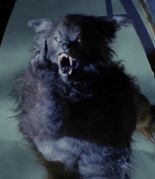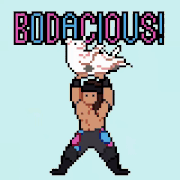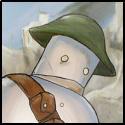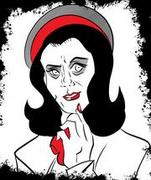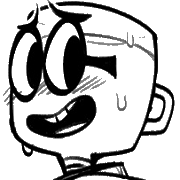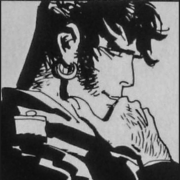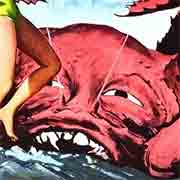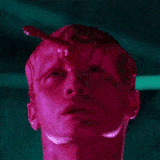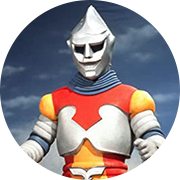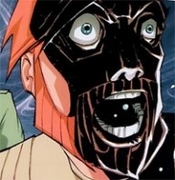|
Saddle Up! Westerns are the major defining genre of the American film industry, a nostalgic eulogy to the early days of the expansive, untamed American frontier (the borderline between civilization and the wilderness). They are one of the oldest, most enduring and flexible genres and one of the most characteristically American genres in their mythic origins. Westerns tell stories set primarily in the later half of the 19th century in the American Old West, often centering on the life of a nomadic cowboy or gunfighter armed with a revolver and a rifle who rides a horse. Westerns often stress the harshness of the wilderness and frequently set the action in an arid, desolate landscape of deserts and mountains. Often, the vast landscape plays an important role, presenting a "...mythic vision of the plains and deserts of the American West". The ambiance is usually punctuated with a Western music score, including American and Mexican folk music such as country, Native American music, New Mexico music, and rancheras. Early Westerns were mostly filmed in the studio, just like other early Hollywood films, but when location shooting became more common from the 1930s, producers of Westerns used desolate corners of Arizona, California, Colorado, Kansas, Montana, Nevada, New Mexico, Oklahoma, Texas, Utah, or Wyoming. These settings gave filmmakers the ability to depict vast plains, looming mountains and epic canyons. Productions were also filmed on location at movie ranches. Often, the vast landscape becomes more than a vivid backdrop; it becomes a character in the film. After the early 1950s, various wide screen formats such as Cinemascope (1953) and VistaVision used the expanded width of the screen to display spectacular Western landscapes. John Ford's use of Monument Valley as an expressive landscape in his films from Stagecoach (1939) to Cheyenne Autumn (1965) "present us with a mythic vision of the plains and deserts of the American West, embodied most memorably in Monument Valley, with its buttes and mesas that tower above the men on horseback, whether they be settlers, soldiers, or Native Americans". Their most prolific era was in the 1930s to the 1960s and found a growing popularity throughout the 1950s and their peak popularity in the 1960s.
|
|
|
|

|
| # ? Apr 26, 2024 13:49 |
|
Effort Post coming soon, with write-ups including but not limited to: Eras and Sub-Genres of Westerns Silent Era (1903 -1920): Edwin S. Porterís innovative 1903 short, The Great Train Robbery, marked the real birth of the genre. Notable films: The Covered Wagon (1923), The Iron Horse (1924), and Tumbleweeds (1925). B-Movie Era (1930 - 1945): Inexpensive, formulaic B Westerns were churned out each year by the hundreds by lesser studios (Columbia, Universal, and Republic) ó mostly for kiddie audiences at matinees. Some were multiple-chapter serials with cliff-hanger plots or series. They featured another round of clean-cut heroes: Hoot Gibson, Harry Carey, Ken Maynard, Tim McCoy, Buck Jones (the Red Rider), Bob Steele (the Two-fisted Hero of the West), William Boyd (Hopalong Cassidy), the Three Mesquiteers, and the Lone Ranger. ďHorse operasĒ had crooning added; they were popularized by Gene Autry (the Singing Cowboy) and Roy Rogers (the King of the Cowboys), with his wife, Dale Evans. The frontier heroes usually represented the ideal masculine role model, never smoking, lying, drinking, swearing, having sex, or gambling. John Wayne was the only truly iconic figure to emerge from the simplistic plots. Notable Films: In Old Santa Fe (1934), The Desert Trail (1935), Tumbling Tumbleweeds (1935), Hit the Saddle (1937), Adventures of Red Ryder (1940), Border Patrol (1943), and King of the Cowboys (1943) Golden Era (1935-1960): B Westerns began to disappear from theaters and appear on television, the genreís development became more "respectable" withwide-screen epics, especially with influence from Fred Zinnemann, George Stevens, John Ford and Howard Hawks. During the era, films began infusing the genre with sex, violence and darker themes. Notable Films: Stagecoach (1939),My Darling Clementine (1946); Fordís Cavalry trilogy [Fort Apache (1948), She Wore a Yellow Ribbon (1949), Rio Grande (1950)] Outlaw (1943), Duel in the Sun (1946), High Noon (1952), Shane (1953), Vera Cruz (1954)The Big Country (1958), The Plainsman (1936), Dodge City (1939), Jesse James (1939), Union Pacific (1939), Red River (1948) and Rio Bravo (1959). Noir Westerns (1940-1960): During the postwar period of the forties and fifties, Westerns took on brooding, dark, and intense themes. Hollywood infused them with cynicism, character complexities, flawed outlaw heroes, and dark pessimism, including revenge, paranoia, and obsession Notable Films: The Ox-Bow Incident (1943), Pursued (1947), Blood on the Moon (1948), The Gunfighter (1950), Bend of the River (1952), The Naked Spur (1953), Johnny Guitar (1954), The Far Country (1954), The Searchers (1956), Forty Guns (1957),Terror in a Texas Town (1958), Ride Lonesome (1959), and The Man Who Shot Liberty Valance (1962). Charro Westerns (1930-1960's) Spaghetti Westerns (1960-1970's) Notable Directors John Ford post by Basebf555 Notable Stars The Essentials *years are approximate Old Western Thread (requires Archives) Franchescanado fucked around with this message at 17:24 on Nov 20, 2018 |
|
|
|
Hell yeah, I just bought the Arrow Complete Sartana boxset and it is crazy to see a non-Leone spaghetti western look as gorgeous as they do. The plots are still cartoon nonsense, but I'm glad that my spaghetti western collection is slowly moving away from Walmart multipack DVDs into something I can watch on my new TV.
|
|
|
|
I watched Peckinpah's Ride The High Country (1962) last night. I wasn't expecting the concentration to turn towards domestic drama and the central plot to center around marital abuse. There are hints of some of the horrific areas Peckinpah would later explore (directly and more disturbing) in Straw Dogs, and I fear for any female character in his films. Still, it was a really good movie. Steve Judd, the lawman who wishes people could be easily defined by good and evil, made weary by reality's disappointing blurred morality, is such an awesome character.
|
|
|
|
The Ballad of Buster Scruggs is a weird picture. Iíve never seen Ladykillers, so itís peculiar to see a Coen Bros joint that isnít polished to a shine, but itís clear that itís a project they really wanted to make and just couldnít quite nail. Iím a mark for both westerns and anthology films, though, so Iím dead center in the target demographic. Overall, it doesnít feel cohesive, which is a bit of a weird criticism to levy at an anthology film, but the tonal and stylistic differences are dramatic and donít work together to evoke an overarching mood or statement as a whole work. It feels like a mark of a lack of confidence that the movie opens with the titular sequence. The Ballad of Buster Scruggs would be better served in the middle of the film. Starting out, it creates an expectation of a fantastical quality that isnít found anywhere else in the movie. In the middle, this wouldíve been a refreshing surprise, especially following the dreary sequence about the dramatic orator, but in the start itís a little odd. That sequence about the orator is the real low point of the film. Morose, cruel, and ableist, itís got a streak of nihilism that other Coen Brothers films manage to make entertaining with an artful touch of absurd humor that never appears here. By contrast, the sequence about the prospector hews really close to a similar pitfall, before soaring out of it when the protagonist brutally reverses the fortune of his predator. Itís still scary and has a mean streak, but the highlight of the scene is a very authentic, humorous performance by Waits as he winds down from having overcome his would-be killer. The picture is, on the whole, a work of absurdist existentialism thatís well situated in the Coen Brosí oeuvre. Unexpected turns of fortune and a sense of cosmic meaninglessness pervade the work, and in that sense, I guess that not having any of that is a surprise in itself, in the case of the orator sequence- it just isnít very entertaining. Overall, itís definitely worth a watch, even if the parts are better than their sum product.
|
|
|
|
If you have archives, we had a real good western thread going once. https://forums.somethingawful.com/showthread.php?threadid=3177262
|
|
|
|
Anonymous Robot posted:The Ballad of Buster Scruggs is a weird picture. Iíve never seen Ladykillers, so itís peculiar to see a Coen Bros joint that isnít polished to a shine, but itís clear that itís a project they really wanted to make and just couldnít quite nail. Iím a mark for both westerns and anthology films, though, so Iím dead center in the target demographic. Overall, it doesnít feel cohesive, which is a bit of a weird criticism to levy at an anthology film, but the tonal and stylistic differences are dramatic and donít work together to evoke an overarching mood or statement as a whole work. I made a joke to my friend about how the anthology was sequenced to follow the Coen's career, and I was surprised that it wasn't far off the mark. The Ballad of Buster Scruggs is highly energetic and comedic despite it's dark premise, similar to Raising Arizona and Fargo. Near Algodones is a detached story with heavy poetic irony, similar to Miller's Crossing Meal Ticket is even more detached and abstract, like Barton Fink (though not as obtuse) All Gold Canyon is a little O Brother and a little Burn After Reading The Gal Who Got Rattled resembles the No Country For Old Men and True Grit, while also dealing with romance, which I guess you could say also slightly resembles Intolerable Cruelty, but the latter is a shallow comparison. The Mortal Remains mostly resembles Inside Llwelyn Davis and A Serious Man, where metaphor and reality bleed together in a somber tone, and leave more work to the viewer It's not a hard-hitting perfect breakdown, but it's a fun thing to think about and, with how it's structured, seems slightly intentional.
|
|
|
|
If anyone would like to do a write-up on any of the subgenres or directors, feel free to do so, and I'll just link to the posts in the 2nd OP
|
|
|
|
I was at the gym the other night and The Lone Ranger was on, and I hadnít seen it since itís theatrical run, so I decided to dig into it a bit. Man is that a frustrating movie. From a production design and cinematography standpoint, itís probably easily one of the best looking films in the entire genre. And the train chase at the end is a legitimately rousing sequence. But like, every single thread in the middle of it is just frayed and tangled. Itís too long, too bloated, narratively ugly, and way too unfocused. Gore Verbinski needs better writers to match his talent behind the lens, full stop. And of course it doesnít help that thereís a giant jackass with bird on his head shaped black hole right in the middle of it.
|
|
|
|
Fart City posted:I was at the gym the other night and The Lone Ranger was on, and I hadnít seen it since itís theatrical run, so I decided to dig into it a bit. Man is that a frustrating movie. From a production design and cinematography standpoint, itís probably easily one of the best looking films in the entire genre. And the train chase at the end is a legitimately rousing sequence. But like, every single thread in the middle of it is just frayed and tangled. Itís too long, too bloated, narratively ugly, and way too unfocused. Gore Verbinski needs better writers to match his talent behind the lens, full stop. Yeah, as much as I like Armie Hammer, I'm not going to watch a movie with Johnny Depp playing a Native American pastiche. Not gonna happen.
|
|
|
|
Franchescanado posted:Yeah, as much as I like Armie Hammer, I'm not going to watch a movie with Johnny Depp playing a Native American pastiche. Not gonna happen. Itís wild that Depp is in both one of the very best films of the genre (Dead Man), and one of the absolute worst. And that gulf is only widened in how Native characters are treated between the two movies. I had a moment where I was like, maybe itís not as bad as I remember. Somehow, it was worse.
|
|
|
|
The real Gore Verbinski western to watch is Rango.
|
|
|
|
Alfred P. Pseudonym posted:The real Gore Verbinski western to watch is Rango. Which is probably the last thing Depp did that I sincerely enjoy.
|
|
|
|
I saw The Lone Ranger in the cinema with my parents when it was a choice between it and Planes. My parents absolutely loved it - really thought it was brilliant - while I was more equivocal (for various reasons), but I couldn't help but smile at that one bit at the end, right before the big train chase starts, when the Lone Ranger rears up on Silver and the William Tell Overture starts blasting out.
|
|
|
|
Western, almost like country music, is one of those genres I never considered myself of, but grew up with, and it wasnít until I was an adult that I considered myself a fan and started watching more intently I like the typical Western, but I think itís treasures also lie in the more Ďexplorativeí stuff, things like The Shooting and High Noon . I havenít done many deep dives into the more obscure stuff. The last one I watched was Breakheart Pass which I thought was just great. I went into it blind and was stuck to my television for the duration and I would recommend. Iíve seen most of the essentials (Eastwood, Ford, Hawks and Criterion stuff) but would be happy to have recommendations to stick on my watch list
|
|
|
|
God drat, I really want to rewatch Dead Man now. That is such a great flick with so many great performances. And that Neil Young score is doooope.
|
|
|
|
Anonymous Robot posted:The Ballad of Buster Scruggs is a weird picture. Iíve never seen Ladykillers, so itís peculiar to see a Coen Bros joint that isnít polished to a shine, but itís clear that itís a project they really wanted to make and just couldnít quite nail. Iím a mark for both westerns and anthology films, though, so Iím dead center in the target demographic. Overall, it doesnít feel cohesive, which is a bit of a weird criticism to levy at an anthology film, but the tonal and stylistic differences are dramatic and donít work together to evoke an overarching mood or statement as a whole work. Boy, it really works for me across the board. I agree that "Meal Ticket" is so dark that it leaves a bit of a bad tasted in my mouth, but overall I found all of them tremendously entertaining. "Buster Scruggs" and "Mortal Remains" make good bookends, as they're probably most upfront about the overarching themes of the anthology. "The Gal that Got Rattled" owns; it's my favorite after watching the movie twice.
|
|
|
|
How are the Sartana films? Arrow have a very nice boxset and I try to blind buy something from Arrow every now and then but a boxset would be a pretty big investment if they're just ok.
|
|
|
|
General Dog posted:Boy, it really works for me across the board. I agree that "Meal Ticket" is so dark that it leaves a bit of a bad tasted in my mouth, but overall I found all of them tremendously entertaining. "Buster Scruggs" and "Mortal Remains" make good bookends, as they're probably most upfront about the overarching themes of the anthology. Music seemed to be incredibly important throughout the whole film
|
|
|
|
FreudianSlippers posted:How are the Sartana films? They're not good movies, but they're fun. Gianfranco Parolini and Giuliano Carnimeo both bring a weird superspy element to the typical spaghetti western. There are tons of gadgets and sharpshooting tricks along with the shootouts and punch-ups. If you want to try out the kind of over-the-top carnival style of Parolini before committing to the boxset, Sabata is a god place to start. It's got Lee Van Cleef, perennial spaghetti western scumbag William Berger and a baffling obsession with dudes jumping off trampolines. There's a pretty good version on YouTube if you search for it.
|
|
|
|
So does Sukiyaki Western Django elicit the same kind of hatred in western fans as Cabin in the Woods does for horror fans? I'm generally a fan of Miike, but here he's going for the same kind of style as Kill Bill era Tarantino, but much more superficial and with what I felt was a sneering air of disconnect, and it loving sucks rear end. It's a shame because it's absolutely gorgeous and it's obvious that Miike can do much better, and the Japanese Django theme is great too.
|
|
|
|
Alfred P. Pseudonym posted:The real Gore Verbinski western to watch is Rango. Rango is such an odd beast, because itís a western but meta because itís about how we use stories in our lives but itís also Chinatown but itís also for kids.
|
|
|
|
X-Ray Pecs posted:Rango is such an odd beast, because itís a western but meta because itís about how we use stories in our lives but itís also Chinatown but itís also for kids. The Hunter S. Thompsons / Raoul Duke cameo is such a bizarre choice. I have 9 days left of FilmStruck, and I'd like to watch more of their Westerns before it's gone. I'm probably going to watch The Lusty Men (1952, with Robert Mitchum) since it's apparently hard to find? Here's a list of Westerns they have available that I haven't seen yet. Are any of these something to watch immediately, that may be obscure or hard to find, or just really really good? 3 Godfathers ('49) 4 For Texas Annie Oakley Honky Tonk Major Dundee McCabe & Mrs. Miller Patt Garrett & Billy The Kid Stagecoach Stars In My Crown The Ballad of Cable Hogue The Burning Hills The Cowboy and the Lady The Deadly Companions The New Land The Outrage The Sea of Grass The Wild Bunch Westward the Women Westworld ('73) Wichita I know McCabe & Mrs. Miller and The Wild Bunch are the two big must-watch movies, but they're readily available elsewhere.
|
|
|
|
Stagecoach is also a must-watch, but itís pretty easy to find as well. Westworldís not so much a western as it is a weird sci-fi/horror movie, but itís definitely worth watching, especially if youíre a horror fan and want to see one of the main inspirations for Michael Myers.
|
|
|
|
Pat Garrett & Billy the Kid is another Peckinpah movie; it isn't as good as Wild Bunch but I think it's very good nonetheless. That said, I don't think it would be hard to find either.
|
|
|
|
Stagecoach is basically the movie that set the standard for Hollywood westerns for decades to come.
|
|
|
|
married but discreet posted:So does Sukiyaki Western Django elicit the same kind of hatred in western fans as Cabin in the Woods does for horror fans? Sukiyaki Western Django is the worst movie Iíve ever seen.
|
|
|
|
X-Ray Pecs posted:Stagecoach is also a must-watch, but itís pretty easy to find as well. Westworldís not so much a western as it is a weird sci-fi/horror movie, but itís definitely worth watching, especially if youíre a horror fan and want to see one of the main inspirations for Michael Myers. Westworld is interesting in that itís kind of a early meta commentary on the genre as a whole. It was released only about a decade or so after the big western boom, and a lot of the ďcontentĒ of the park itself delves into western genre tropes. Like the Man In Black is specifically an archetype of it.
|
|
|
|
Stagecoach is essential, because you are basically witnessing the birth of a genre and one of most iconic movie stars of all-time all in one shot. On that note, lets talk about the guy that most people consider the father of the Western, at least in terms of feature films. John Ford is remembered mostly as a Western director, but really he was just one of the most prolific filmmakers of his era. Most people would separate his career into two halves, pre-war and post-war. In 1939, Ford made his first Western featuring sound, and right out of the gate he redefined the Western in the minds of audiences. Stagecoach was not just frivolous entertainment for children, it was a real movie with complex characters and a much larger scope than other Westerns at the time. About two decades later, Akira Kurosawa would take many of the lessons learned from Stagecoach and apply them to his own work, and like Ford expanding the scope of what people were used to seeing when they went to the theater. In particular, Kurosawa adopted Ford's dynamic way of shooting action, which can be seen in the horse chases in Stagecoach and The Hidden Fortress.   What doesn't really translate to still photos is the kinetic energy that Ford was able to get into these scenes. Cuts that emphasize the power and speed. Close ups that give you a sense of the intensity of the action, but not so close that you lose your sense of geography. These elements that Kurosawa adopted made his work stand out among his peers, and also probably contributed to his being labelled as "too western" by his own country at the time. These scenes are also a primary influence for another iconic chase, in Spielberg's Raiders of the Lost Ark. Post-war, Ford continued to make Westerns but you can start to see his characters changing a bit. His first film after returning from the war was My Darling Clementine, a Western that features a pretty unambiguous good guy in Wyatt Earp, but at the same time Ford has begun to examine the idea of The Old West in a more nuanced way than before. While he never went as far as some of his successors in that regard, the decade after WWII saw Ford gradually ramping up that element of his storytelling, which of course culminated in what I feel is the greatest Western of all-time, The Searchers.   Featuring maybe the best opening and closing shots in film history, The Searchers is Ford's best looking film and also probably his most complex. People who go back and watch it today may not immediately have a sense of how ground-breaking John Wayne's character was, and certainly the politics of the film is outdated and/or problematic at points, but it's influence is undeniable. Scorsese once said in an interview that Wayne's Ethan(paraphrasing) "holds all of the hate of the West inside him", which I thought was an apt description. And it's the first time a director so directly confronted that hate instead of glossing over it. On a technical level, The Searchers(also Stagecoach, of course) is a prime example of how John Ford used great ensemble casts to the fullest extent. In dialogue scenes, Ford often stuck to wider shots than many other directors, allowing multiple characters to appear in the scene and inject those little character bits that make Ford's characters so memorable. It also results in better, more painterly images overall in my opinion. More in the frame isn't always better, but when it's all so meticulously designed like in a John Ford film, it often is. And it's just a flat-out better way of telling a story, because multiple characters can be developed all in the same shot.   Monument Valley often gets top-billing when Ford is discussed, and I understand why of course, but there is so much for to Ford as a filmmaker. He was a innovator, a ground-breaking technician that will always be on the Mount Rushmore of American directors. So yea, go watch Stagecoach. Basebf555 fucked around with this message at 17:07 on Nov 20, 2018 |
|
|
|
Was Stagecoach also the one Ford was asked, "Why didn't they just shoot the horses pulling the stagecoach?" and he replied, "Because then the movie would end."? I enjoy that story.
|
|
|
|
If anyone else would like to do cool write-ups about directors, films, actors, etc., Iíll throw them in the infodump post
|
|
|
|
This thread has inspired me to do two things: Finally watch Mario Bava's Roy Colt & Winchester Jack, which I've owned on DVD for like a decade but haven't seen yet, and: rewatch The Searchers, which I was sour on the first time and now I can't even remember why.
|
|
|
|
I won't deny that the Dollars trilogy is terrific, but Once Upon a Time in the West is the best Sergio Leone movie, and Clint Eastwood's self directed westerns like High Plains Drifter are better uses of his particular acting style. I'll admit that most of my exposure to westerns comes from genre blending takes like Rodriguez's Mariachi films, From Dusk Til Dawn, or satires like Walker or Blazing Saddles. I never really watched any John Ford films apart from The Quiet Man, which isn't a western to begin with. Arc Hammer fucked around with this message at 19:26 on Nov 20, 2018 |
|
|
|
I bounce around on which Leone I think is the best, which probably just means he made four masterpieces and they're all equally great in their own way. Fistfull of Dollars is so perfectly streamlined, it goes from point to point so smoothly and you're never bored for a second. For a Few Dollars More is bigger and more epic, and sometimes I feel like the story is better than The Good the Bad and the Ugly, which has it beat in some other areas. Once Upon a Time in the West is Leone throwing all of that together and using the best parts of all three Dollars films, and I do think that if Eastwood had starred in it more people would say it's Leone's best. It has a great villain, multiple storylines going at once, an amazingly satisfying climax, and what I would argue is the best single sequence Leone ever shot(fans of the duel in The Good the Bad and the Ugly may disagree) with Claudia Cardinale entering Flagstone for the first time. https://www.youtube.com/watch?v=7WPMoVtHSOs
|
|
|
|
Iím not particularly well-verses on Westerns, but itís a genre I want to get more into. That said, I agree that Once Upon A Time In The West is better than any of the Man with No Name Trilogy (grantees Iíve never seen the theatrical cut of The Good...). Iíd say check out My Darling Clementine for a good Ford western, itís wonderful.
|
|
|
|
Put me in the Once Upon a Time in the West camp too. It's an amazing movie. Thoughts on Duck, You Sucker (aka A Fistful of Dynamite)? That's another one I own but haven't seen yet.
|
|
|
|
Spatulater bro! posted:This thread has inspired me to do two things: Finally watch Mario Bava's Roy Colt & Winchester Jack, which I've owned on DVD for like a decade but haven't seen yet, and: rewatch The Searchers, which I was sour on the first time and now I can't even remember why. I don't know what it was in your case, but a lot of people bounce off The Searchers on their first viewing. I think it mainly comes down to two reasons: 1. It's frequently listed as the greatest Western of all time, a reputation no film could survive. Not too dissimilar from young film buffs eagerly checking out Citizen Kane and being disappointed because it doesn't provide them with a religious epiphany. 2. Because it is so highly regarded, a lot of people use it as their first foray into the world of the classic studio Western. But a large part of what makes The Searchers great is the way it recontextualises many conventions of the genre. It's Ford self-critically commenting on the films that he made himself or influenced, discussing issues that previously were ignored or simplified. Without an understanding of what the classic Western was like, part of that nuance gets lost. Which is why I'd strongly caution against anyone starting their journey into the Hollywood Western with the film. My Darling Clementine or Stagecoach are much better entry points.
|
|
|
|
Samuel Clemens posted:I don't know what it was in your case, but a lot of people bounce off The Searchers on their first viewing. I think it mainly comes down to two reasons: I agree with all of your points but for me The Searchers was my first Ford film, and even though I didn't "get it" in full context until a few years and a few viewings later, the grandeur and scope of the whole thing won me over instantly. So I think if there's one thing about it that makes it a good entry point, it's that Vistavision format where the vivid colors of Monument Valley just fill the screen and if you have a decent home set-up it really is an eye opener on blu ray in a way that the earlier stuff filmed in the Academy ratio aren't. Hitchcock filmed a few of his most famous movies(Vertigo, North by Northwest) in Vistavision and they're just as visually impressive.
|
|
|
|
Basebf555 posted:I agree with all of your points but for me The Searchers was my first Ford film, and even though I didn't "get it" in full context until a few years and a few viewings later, the grandeur and scope of the whole thing won me over instantly. So I think if there's one thing about it that makes it a good entry point, it's that Vistavision format where the vivid colors of Monument Valley just fill the screen and if you have a decent home set-up it really is an eye opener on blu ray in a way that the earlier stuff filmed in the Academy ratio aren't. This was my exact experience with The Searchers, I didnít care for it overall but goddamn itís a gorgeous movie. I need to watch more Westerns before rewatching it or watching Unforgiven for the first time.
|
|
|
|

|
| # ? Apr 26, 2024 13:49 |
|
My Name is Nobody is a pretty fun little film at least partially directed by Leone that no one seems to talk about much.
|
|
|



